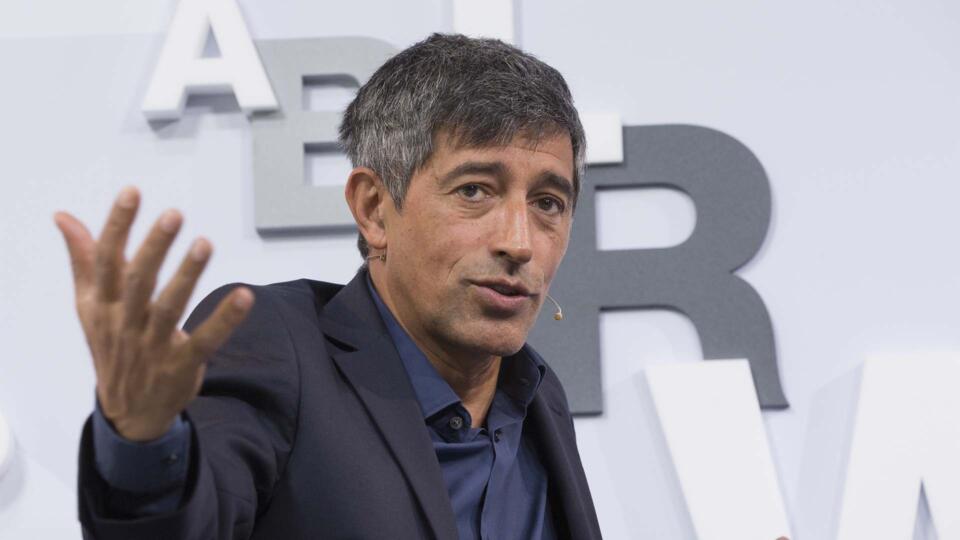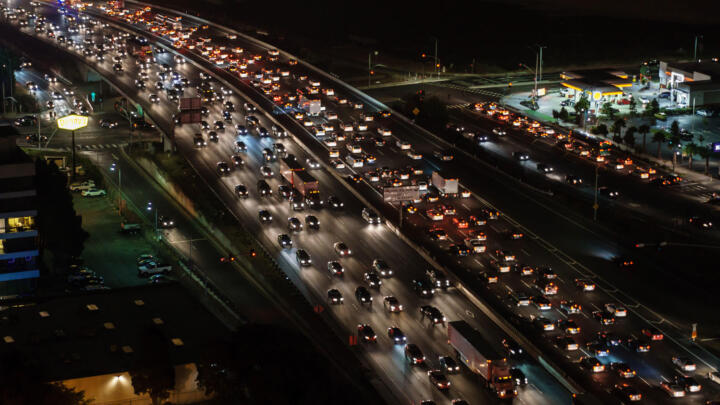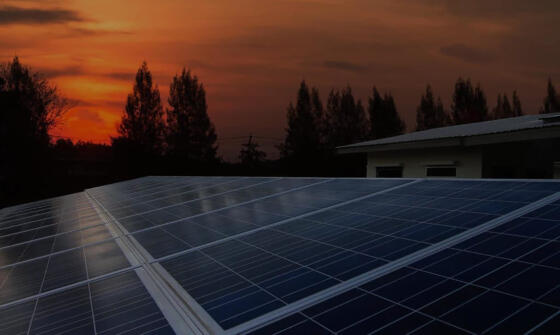
“We need to change”

Transformations presuppose decisions. But the decisions we make today may have effects for several years, if not decades. This said, how can we chart the course for a future we don’t even know yet?
Obviously, we don’t know our future, but we’re able to define goals. Above all, we have to decide what we really want. For many of us it’s the desire – one that’s definitely worth striving for – to leave the Earth to our children and grandchildren in a better state than we found it ourselves. This includes the planet itself, as well as our social interactions. You see, a look at humanity’s environmental footprint, the changes caused by agriculture, by urbanization, by major construction projects like hydropower dams which change nature’s topology shows that in several respects we’ve already become shapers of this planet …

… which can even be seen on satellite pictures of Earth at night that show increasingly vast expanses of light.
Our planet is indeed shining brighter and brighter. I often think of my childhood which I spent in India – India back then was dark and regarded as backward. Today, the whole country is illuminated. There are two things that electric light, which has spread across this planet in a very short period of time, shows: one of them is the diffusion of progress. The highly technologized nations used to be islands and now the entire planet has become illuminated. The other aspect, of course, is the growing resource and energy consumption which is indirectly reflected by the emission of light. One of these two, the spreading of technological progress, is a good thing and the other one is a challenge we need to master in the next few years. Our limited resources are insufficient if we continue to do business as usual. We need a change of heart and pursue new paths so that all human beings can sustainably benefit from progress!

The pace of technological progress is virtually breath-taking at the moment. Too fast for many people. For normal citizens, key technologies like artificial intelligence and the algorithms behind them are as cryptic as quantum physics. Does this ignorance perhaps make us too careless, are we letting too much digital power slip away from us?
This risk does exist. Many of us surround themselves with devices like Amazon Echo or Google Home without really knowing how these technologies work. We use social networks but hardly any of us can see through the algorithms that structure and are essential to these networks. Digital neuronal networks are already in use today although even experts do not understand how these complex systems really function. At the moment, when it comes to new technologies, we’re like children that unwrap a gift and immediately start playing. What we’re lacking is a kind of user manual for progress.

In 2010, Google’s CEO Eric Schmidt made a memorable statement: “We know where you are, we know where you’ve been and we can more or less know what you’re thinking about.” Sounds scary.
Data-gathering platforms like Google or Facebook are so large now that they’ve become systemically relevant. A network with such massive influence on the interactions within a society should disclose its algorithms. Digital culture offers us a new form of interaction we didn’t know a few years ago. We first need to learn its rules and actively address its opportunities. It would be very unfortunate if digitalization blew up in our face because we failed to do our homework.

So, how well has the automotive sector done its homework?
OEMs and suppliers have been optimizing vehicles bit by bit over the past decades, making them safer and more efficient. But the great opportunity that presents itself to us lies in thinking on a broader scale, in other words not in terms of optimizing an individual vehicle but in terms of optimizing new mobility concepts. The need for this is very obvious in practically any city where only a single occupant can typically be seen sitting in the cars passing by. If Martians were to look at this they’d think that Homo sapiens must be peculiar creatures – moving a ton and a half of steel in order to carry 70 kilos of a human being back and forth …

… and to then park the steel without further use for most of the day.
Exactly. The plethora of cars parked in our streets costs space – which really is of no benefit to anyone. For comparison: Looking at today’s car sharing concepts shows that a single shared car replaces about 20 individual vehicles. This accounts for about 200 square meters (about 2,153 square feet) which could also be used to enhance traffic flow. Technological progress unleashes plenty of new potential – but we’re not fully tapping into it if we continue to think in old categories. Sometimes you need to jump – into a new perspective.

Could regulations, decrees and laws facilitate this jump?
To some extent, they could. A positive example is the catalytic converter for vehicle emissions that was introduced in California in 1968 by legislation and has since become a worldwide standard. But, as said before, this has made individual cars better, but not the traffic situation or mobility as a whole.

A paradigm shift is not only necessary – it’s also possible
Ranga Yogeshwar

If laws are not enough to cause us to tap into existing potential and to give us a jump start, then what or who will?
Looking at young urbanites for instance who often choose not to own a car and tend to rely on alternative mobility concepts like car sharing shows that the new potential, specifically digitalization in this case, has been more conducive to establishing this form of mobility than legislation. Regulations are important, too, but creativity tends to be inspired whenever we realize that we have to reflect on existing issues again. A closer look at this in the context of mobility reveals the beginnings of a change in thinking: personally owning a car – which, by the way, isn’t a desire that’s based on a natural instinct – doesn’t necessarily matter anymore. What does matter is efficient vehicle utilization. Particularly young people are recognizing this. The number of young car buyers has been declining in recent years, especially in urban areas. And there are indications that the auto industry has recognized this as well and is in the process of accelerating the development of new concepts.

So we’re on the verge of a general paradigm shift?
This paradigm shift is not only necessary – it’s also possible. The latter aspect is particularly important because we sometimes wish for a different future but are not able to see how to make it happen. And that’s where the innovations in recent years and even decades have been pointing out new paths, too.

Outside the realm of mobility as well?
In any area, at least as far as I can see, there are promising approaches. Let’s take energy production. Factually, we have no energy problem. The sun – whenever it shines – radiates with an intensity of about one kilowatt per square kilometer (0.39 square miles). One thousand watts is quite a bit. A look at the efficiency of today’s solar collectors in the field of photovoltaics shows that – after a very small percentage just a few years ago – it’s now in the double digit range so that considerable amounts of solar energy can be used. The next step will be to efficiently store this energy for those moments when the sun doesn’t shine or in order to balance the grid. Power-to-gas systems or synfuels produced with electricity are highly interesting technologies in this context.

Another example please.
We’re discussing pollinator decline and, linked to this phenomenon, the use of herbicides and insecticides in agriculture. We all notice that we’re facing an increasing problem because we’re applying massive amounts of toxins, yet many of us can’t see a real alternative. It’s clear to anyone who takes at least some interest in agriculture that we can hardly do without such agents at the moment. But now we’re suddenly seeing the advent of artificial intelligence, of robotics, of automated vehicles and I can definitely imagine that in ten years from now we’re going to see autonomously acting robots clearing our fields of weeds. This new technology might replace the use of chemicals in agriculture in similar ways as solar power is going to replace coal someday.

Are ideas like these that result from out-of-the-box thinking the key to success?
They definitely are! But exactly this type of thinking that goes beyond previously learned patterns is so difficult. A look at history shows this as well because we’re not the first generation that has dreams of the future. At the beginning of the 20th century, people were dreaming of railroads, steamships and Zeppelins flying through cities. In a way, this shows that every generation, when dreaming of the future, cleaves to its own categories. This means that we “think our world” and then extrapolate – we’re hardly able to comprehend or, what’s more, to anticipate any leaps in advance. Only ten years ago, no one had any idea of the fundamental transformations the smartphone would lead to. The exciting part about this is that with any of these technological options we always need to check social, and perhaps ethical, principles as well. We should be careful not to make any visions reality that are strictly technology-driven. I rather believe in what I refer to as reflected progress which means giving serious thought to the goals we pursue and then, in the next step, to think about what technologies we might be able to use to achieve them.

How sustainable can or must such reflected progress be?
Anyone who advocates sustainability in the spirit of sacrifice compared with the status quo will fail. We’ve seen this in recent years. There have been plenty of activists, dedicated people, saying that we need to consume less – without realizing that this isn’t a road that leads to success.

And what would be a road to success?
We’re already starting to see a certain change of heart in some areas. Although large-scale synthetic-industrial production of food is no problem today, it’s interesting to see that more and more people decide to cook their meals at home for a change and to buy regional produce. Essentially, these are some initial indications of responsible choices being made in favor of sustainability. But, in the light of the enormous changes we’re facing, what all of us need to do together as members of society is to get clear about our goals. Where do we really want to go?

In such debates about the future, the phrase “great transformation” can often be heard. What will it take, on the part of industry and the economy – here and in the world at large – to achieve a kind of transformation that’s fit for the future?
It may take this vision of imagining a world in 10 or 15 years from now in order to realize that change involves a lot more than just a detail in a particular manufacturing process or industry. Perhaps, in some areas, we’re now able to delegate a major part of our work to machines for the first time. On the one hand, this gives us more time to take care of other things in life which are important for our society, such as education and culture. On the other hand, we need to think about the distribution of income and thus of food and consumer goods because a society that at some point in time will turn a minority into winners and the rest into losers is not stable. That’s not going to work. Some initial approaches to this discussion already exist, such as unconditional basic income …

… which is rejected by many. After all, a large part of humanity defines itself through work.
That’s right. And revising precisely this concept of ourselves, departing from the old categories of our forebears, to really break these molds and to set new categories is easier said than done. Especially since such change of heart has to occur across borders because our global economic system requires a certain synchronicity of insight. However, inertia with respect to change is particularly evident in nations that are very successful – like Germany. Our economy is doing well at the moment and, as a result, many people have mental blocks, saying, ‘let’s continue to do business as usual because everything’s okay.’ Many people don’t understand that we’re in the midst of a fundamental transformation process that we need to keep pace with so that we won’t fall behind.

So, Germany and the world will have to leave the beaten track and take the “next exit: the future” – to touch upon the title of your book. What will happen if we miss the exit?
The historically provable fact that major epochal changes often went hand in hand with crises, with wars, with many people suffering, should be a warning to all of us. My hope is that this time we’ll manage to avoid this. But this will require all of us to actively work together and to jointly shape this future. Those who think that any company or any country can shape a common future for everyone are wrong. I believe that this is a task we all have to assume. My optimism, though, is inspired by the opportunities, freedoms and possibilities that technological progress on balance brings in its wake – no matter how unsettling it may seem here and there. However, in the light of this progress happening at such a tremendous pace and with obvious effects on so many spheres of life, the need for philosophical, social and ethical reflection is vital.
The interviewee: Ranga Yogeshwar

Ranga Yogeshwar is a “native speaker” of several languages. In his childhood days, his mother spoke Luxembourgish with him and his father English and Tamil, his teacher Hindi, their housekeeper Kannada and their gardener Malayalam. Later, he learned to speak French and German as well. Asking the man in his late fifties with a degree in physics about his national identity is another complex question: Does he feel more like an Indian, a Luxembourger or a German? Above all, he says, he feels like Ranga Yogeshwar. A question of much greater relevance to him, though, is the one about his personal “operating system”: the Age of Enlightenment and the German Constitution. In 1986, after the Chernobyl disaster, Yogeshwar made his debut on camera as a technology explainer. Coming from a multicultural background, he was a rare exception among German TV presenters back then. Fortunately, times have changed in this respect.


